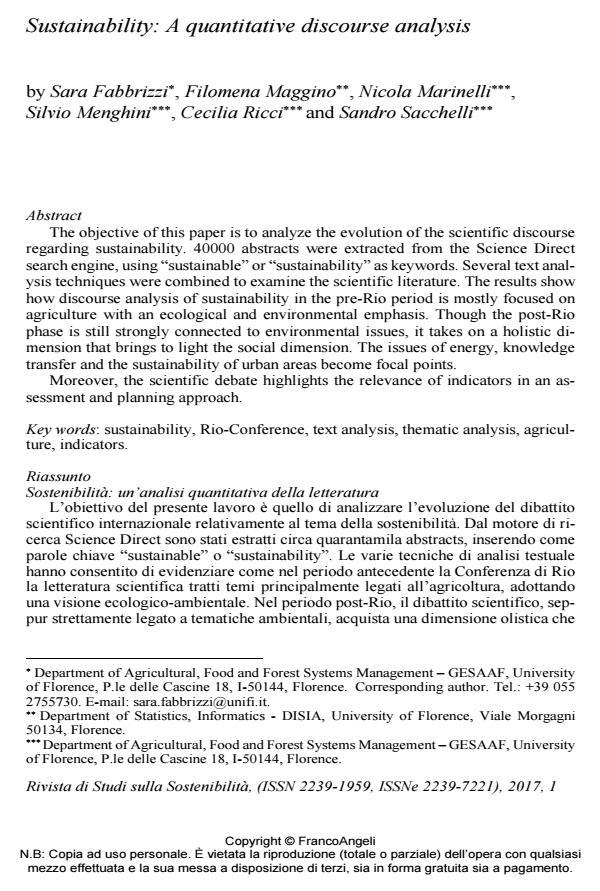Sustainability: A quantitative discourse analysis
Journal title RIVISTA DI STUDI SULLA SOSTENIBILITA'
Author/s Sara Fabbrizzi, Filomena Maggino, Nicola Marinelli, Silvio Menghini, Cecilia Ricci, Sandro Sacchelli
Publishing Year 2017 Issue 2017/1
Language English Pages 15 P. 11-25 File size 210 KB
DOI 10.3280/RISS2017-001003
DOI is like a bar code for intellectual property: to have more infomation
click here
Below, you can see the article first page
If you want to buy this article in PDF format, you can do it, following the instructions to buy download credits

FrancoAngeli is member of Publishers International Linking Association, Inc (PILA), a not-for-profit association which run the CrossRef service enabling links to and from online scholarly content.
The objective of this paper is to analyze the evolution of the scientific discourse regarding sustainability. 40000 abstracts were extracted from the Science Direct search engine, using "sustainable" or "sustainability" as keywords. Several text analysis techniques were combined to examine the scientific literature. The results show how discourse analysis of sustainability in the pre-Rio period is mostly focused on agriculture with an ecological and environmental emphasis. Though the post-Rio phase is still strongly connected to environmental issues, it takes on a holistic dimension that brings to light the social dimension. The issues of energy, knowledge transfer and the sustainability of urban areas become focal points. Moreover, the scientific debate highlights the relevance of indicators in an as-sessment and planning approach.
Keywords: Sustainability, Rio-Conference, text analysis, thematic analysis, agri-culture, indicators.
- The perception of palm oil by Millennials: A semantic differential approach Nicola Marinelli, Maria Cipollaro, Safwat H. Shakir Hanna, Carlotta Innocenti, Sara Fabbrizzi, in RIVISTA DI STUDI SULLA SOSTENIBILITA' 1/2021 pp.93
DOI: 10.3280/RISS2021-001006 - A systematic review of ecosystem services modeling for environmental health assessment Kalra Marali, Robert M Chiles, Jason P Kaye, Christine J Kirchhoff, Lisa Wainger, Raj Cibin, in Ecological Indicators 113245/2025 pp.113245
DOI: 10.1016/j.ecolind.2025.113245 - Methodological PLS-PM Framework for SDGs System Rosanna Cataldo, Corrado Crocetta, Maria Gabriella Grassia, Natale Carlo Lauro, Marina Marino, Viktoriya Voytsekhovska, in Social Indicators Research /2021 pp.701
DOI: 10.1007/s11205-020-02271-5 - Transition towards Well-being Sustainability:Approach to "Circular Economic Model" Nicola Marinelli, Gian Paolo Cesaretti, Immacolata Viola, in RIVISTA DI STUDI SULLA SOSTENIBILITA' 2/2022 pp.263
DOI: 10.3280/RISS2021-002019
Sara Fabbrizzi, Filomena Maggino, Nicola Marinelli, Silvio Menghini, Cecilia Ricci, Sandro Sacchelli, Sustainability: A quantitative discourse analysis in "RIVISTA DI STUDI SULLA SOSTENIBILITA'" 1/2017, pp 11-25, DOI: 10.3280/RISS2017-001003